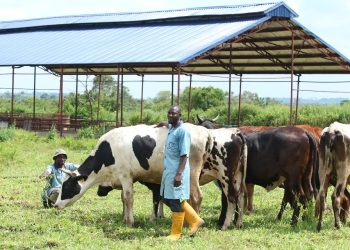Some weeks ago, Facebook founder, Mark Zuckerberg, came calling. He was in Lagos to meet with some techpreneurs and pay a visit to venture startup, Andela. He also came to feel the pulse of Nigerians and decided to take a walk on the streets of Yaba in Lagos, where the $24 million venture in which he and his wife, Chan, have substantial interest is located.
He met with some players in the Nigerian ICT space where they exchanged ideas on how to expand the nation’s digital sector. Zuckerber took out time for meetings with President Muhammadu Buhari and Vice-President Yemi Osinbajo as well as some senior government officials in Abuja. He also attended the Aso Villa Demo Day.
A significant takeaway from the visit was the release of photos of Zuckerberg walking on a Yaba street and jogging on the Ikoyi-Lekki link bridge. No less interesting were series with Buhari. These resonated with Nigerians and generated considerable buzz on the internet. It was quite significant that the world’s seventh richest individual could brush aside all the trappings of wealth usually associated with this clime and take a walk on a street clogged with stagnant puddles of water.
For him to have found time to jog on a public bridge without overzealous bodyguard was am experience in humility, as many commentators on social media observed. That he could also take out time to give people talks to Nigerian developers and affirm his commitment to supporting the growth of its ICT sector is encouraging. It is instructive to note that Zuckerberg and his wife through the Chan Zuckerberg Initiative inspired the bid round that raised the venture capital.
Quartz Africa, an authoritative journal on affairs on the continent, said in a recent edition that it was CZI’s first major investment and first time leading a financial round since it was set up in December 2015. Andela was founded by Iyinoluwa Aboyeji (a Nigerian) and Jeremy Johnson and is backed by solid venture capital seed backers, Quartz Africa says, and acts like an outsourcing firm for developers.
It explains that Andela is poised to link African developers with the new global economy, given the shortage of developers in Silicon Valley and high youth employment rate in African countries like Nigeria.
The new global economy provides a wide array of opportunities for Nigerians to showcase their abundant energy, enterprise and vision. It presents opportunities for Nigerians to play as equal partners with nationals of other countries on the global stage. Zuckerberg in comments after his meeting with Buhari underscored the new thinking of the international community about Nigeria.
His words: “I was highly impressed by the talent of the youths in the Co-creation Hub in Yaba. I was blown away by their talent and the level of energy that I saw.” Such encouraging words coming from someone who has enjoyed the benefits that an advanced society can offer is something for Nigerian leaders to consider in the search for solutions to the biting recession.
The Buhari administration has a big challenge to develop policies that would stimulate the nation’s digital economy. It therefore has to take another look at restrictive policies and tariffs that inhibit the ICT sector in Nigeria if it truly wants to real immense benefits from the unfolding revolution.
There must be a deliberate effort to redress those obstacles that place Nigeria on negative rankings in the World Bank’s Ease of Doing Business for 2016. Government also needs to deal with Nigeria’s poor standing in ICT issues in sub-Saharan Africa. Efforts must also be made to encourage the growth of Nigerian ICT startups to absorb the growing number of youths getting into the sector.
Government must view ICT as a key aspect of its economic policy direction and diversification programme. Nigeria cannot afford to continue to lag behind in the keen global competition to maximise opportunities in the digital economy. Buhari’s comments while receiving Zuckerberg at the State House on September 2, 2016 demonstrated his appreciation of the Facebook founder’s visit and its potential for Nigeria. Aboyeji, who co-founded Andela, is currently making waves in other areas of the ICT sector.
Nigerian youths must also rise to the occasion and seek out ways of competing favourably with their peers in other climes. The fixation with paid employment should be discarded for self-drive innovations. There are many good examples like Aboyeji that Nigerian youths can follow.
There is also Chinedu Echeruo, who sold his HopStop. com firm for over $1bn to Apple. Many more of such trailblazers exist in Nigeria. You can find them among the 18 million Nigerians on Facebook. It will take serious effort to search them out and nurture them to global recognition. That’s a challenge that must be accomplished from Zuckerberg’s 2016 visit to Nigeria.










































